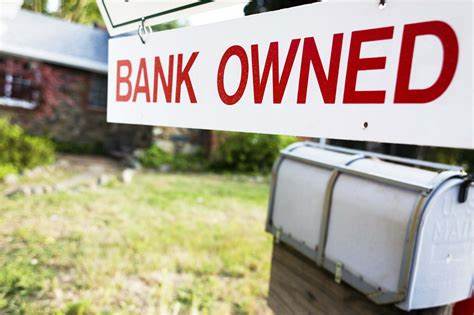What Are Bank-Owned Properties?
Bank-owned properties, also known as real estate owned (REO) properties, are those that have reverted to the lender, typically a bank, after an unsuccessful foreclosure auction. In the UK, these properties become part of the bank's portfolio and are often sold to recover the outstanding mortgage balance. They can be marketed as bank repossessed houses for sale and may include various types of real estate, from residential homes to commercial spaces.
These properties are usually sold "as-is," meaning the bank does not make any repairs or renovations before the sale. This can present both challenges and opportunities for buyers. On the one hand, the buyer may have to invest in repairs; on the other hand, the properties are often priced below market value to facilitate a quick sale.
Why Bank-Owned Properties Create a Buyer’s Market
Bank-owned properties can create a buyer's market due to their typically lower prices and the banks' motivation to sell them quickly. Since banks are not in the business of managing real estate, they are often willing to accept offers below the asking price, especially if the property has been on the market for an extended period. This scenario can lead to foreclosed homes for sale near me being available at attractive prices, making them appealing to investors and first-time buyers alike.
In many UK cities, the presence of bank-owned properties for sale in {city} can significantly impact local real estate markets. These properties increase the overall inventory, providing buyers with more options and potentially driving down prices due to increased competition among sellers.
Benefits of Purchasing Bank-Owned Properties
Purchasing bank-owned properties offers several advantages. First and foremost, these properties are often priced below market value, providing an opportunity for buyers to acquire real estate at a reduced cost. This price reduction can be particularly attractive in high-demand areas where property prices are otherwise prohibitive.
Additionally, buying bank-owned properties can be less risky than purchasing at a foreclosure auction. At auctions, buyers must often pay in full without the opportunity for a thorough inspection. In contrast, purchases through banks allow for due diligence, including inspections and securing financing, thereby reducing the financial risk associated with unforeseen issues.
Furthermore, banks clear any liens or back taxes on these properties before selling, simplifying the process for buyers. This means that when you find bank-owned properties in {city}, they are generally free from legal complications that could otherwise delay or complicate the purchase.
The Role of Real Estate Professionals
In navigating the market of bank-owned properties, real estate professionals play a crucial role. They have access to listings of foreclosed homes nearby and can provide valuable insights into the valuation and condition of these properties. Their expertise in negotiations can also help buyers secure the best possible deal.
Real estate agents familiar with bank-owned properties can guide buyers through the complexities of the purchase process, ensuring that all necessary paperwork is completed accurately and efficiently. This professional guidance is particularly important given the unique challenges associated with buying properties directly from banks, such as understanding the bank's selling process and terms.
Due Diligence: Inspecting Bank-Owned Properties
Conducting due diligence is essential when considering the purchase of bank-owned properties. This includes a thorough inspection of the property to identify any potential issues that could affect its value or require significant repairs. Buyers should consider hiring a professional home inspector to assess the property's condition, focusing on elements such as the roof, foundation, plumbing, and electrical systems.
Another aspect of due diligence involves researching the property's history, including previous ownership and any past legal issues. Understanding the local market conditions and comparable property values is also crucial to ensure that the purchase price reflects the property's true worth.
Market Analysis of Bank-Owned Properties in Selected UK Cities
|
City
|
Average Price Reduction (%)
|
Number of Bank-Owned Listings
|
Data Source
|
|
London
|
15%
|
320
|
UK Property Database
|
|
Manchester
|
12%
|
150
|
Real Estate Insights
|
|
Birmingham
|
10%
|
200
|
Housing Market Reports
|
|
Edinburgh
|
18%
|
90
|
Scottish Property Data
|
|
Bristol
|
14%
|
110
|
South West Housing Index
|
Bank-owned properties in the UK present a unique opportunity for buyers to acquire real estate at potentially reduced prices. Understanding what these properties are, why they create a buyer's market, and the benefits they offer can help buyers make informed decisions. By leveraging the expertise of real estate professionals and conducting thorough due diligence, buyers can navigate the complexities of purchasing bank-owned properties effectively. As the market continues to evolve, staying informed about trends and opportunities in bank-owned properties will be crucial for successful investment.
References

